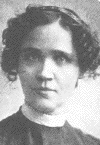
|
Voltairine de Cleyre (1866-1912) |

|
published by the Free Society Group, Chicago, 1932 |
What could be added to this splendid tribute by Jay Fox to the memory of Voltairine de Cleyre? The real biography of Voltairine de Cleyre is to be found in the letters she wrote to her comrades, friends and admires, for like many other women in public life, she was a voluminous writer. Born shortly after the close of the Civil War, she witnessed during her life the most momentous transformation of the nation; she saw the change from an agricultural community into an industrial empire; the tremendous development of capital in this country with the accompanying misery and degradation of labor. Her life path was sketched when she reached the age of womanhood; she had to become a rebel! To stand outside of the struggle would have meant intellectual death. She chose the only way. Voltairine de Cleyre was born on November 17, 1866, in the town of Leslie, Michigan. She died on June 6, 1912, in Chicago. She came from French-American stock on her father’s side, and of Puritan on her mother’s. Her father, Auguste de Cleyre, was a native of Western Flanders, but of French origin. Being a freethinker and a great admirer of Voltaire, he named his daughter Voltairine. She did not have a happy childhood; her earliest life was embittered by want of the common necessities, which her parents, hard as they tried, could not provide. A vein of sadness can be traced in her earliest poems — the songs of a child of talent and great fantasy. Strength of mind did not seem to have been a characteristic of Auguste de Cleyre, for he recanted his libertarian ideas, returned to the fold of the church, and became obsessed with the idea that the highest vocation for a woman was the life of a nun; so he sent her to the Convent of Our Lady of Lake Huron at Sarnia in Ontario, Canada. But Voltairine’s spirit could not be imprisoned in a convent. After she was there a few weeks she ran away. She crossed the river to Port Huron but as she had no money she started to walk home. After covering seventeen miles, she realized that she could never do it; so she turned around and walked back, and, entering the house of an acquaintance in Port Huron, asked for something to eat. They sent for her father who afterwards took her back to the convent. After a while, however, she again ran away, this time never to return. Reaction from repression and the cruel discipline of the Catholic Church helped to develop Voltairine’s inherent tendency toward free thought; the five - fold murder of the labor leaders in Chicago in 1887 shocked her mind so deeply that from that moment dates her development toward Anarchism. When in 1886 the bomb fell in the Haymarket Square, and the Anarchists were arrested, Voltairine de Cleyre, who at that time was a free thought lecturer, shouted: “They ought to be hanged!” They were hanged, and now her body rests in Waldheim Cemetery, near the grave of those martyrs. Speaking at a memorial meeting in honor of those comrades, in 1901, she said: “For that ignorant, outrageous, blood - thirsty sentence I shall never forgive myself, though I know the dead men would have forgiven me, though I know those who loved them forgive me But my own voice, as it sounded that night, will sound so in my ears till I die — a bitter reproach and a shame I have only one word of extenuation for myself and the millions of others who did as I did that night — ignorance.” She did not remain long in ignorance. In The Making of an Anarchist she describes why she became a convert to the idea and why she entered the movement. “Till then,” she writes, “I believed in the essential Justice of the American law and trial by jury. After that I never could. The infamy of that trial has passed into history, and the question it awakened as to the possibility of Justice under law has passed into clamorous crying across the world.” Voltairine spent the greater part of her life in Philadelphia. Here, among congenial friends, and later among the Jewish immigrants, she did her best work, producing an enormous amount. Her poems, sketches, propagandist articles and essays may be found in Open Court, Twentieth Century, Magazine of Poetry, Truth, Lucifer, Boston Investigator, Rights of Labor, Truth Seeker, Liberty, Chicago Liberal, Free Society, Mother Earth, and in The Independent. In an exquisite tribute to her memory, Leonard D. Abbott calls
Voltairine de Cleyre a priestess of Pity and of Vengeance, whose voice has a vibrant
quality that is unique in literature. We are convinced that her writings will live as long
as humanity exists.
|
|
|